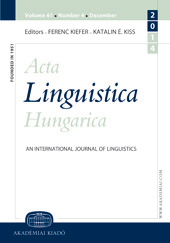Predicate inversion and English there-sentences
Predicate inversion and English there-sentences
Author(s): Jutta M. HartmannSubject(s): Syntax
Published by: Akadémiai Kiadó
Keywords: existential sentences; there-BE sentences; there-V sentences; predicate inversion; predication;
Summary/Abstract: This squib argues against the predicate inversion analysis of English existential there-sentences. The main problem of this analysis is caused by wh-extraction data. Wh-extraction is possible of and from the noun phrase in there-BE (there-sentences with the copula), but not in there-V sentences (there-sentences with other verbs). This is not predicted by the predicate inversion analysis. It is shown that the predicate inversion analysis is adequate (with some modifications) for there-V sentences and locative inversion. Existential there-sentences, however, need to be analysed differently. They are derived from a predication configuration in which there is the subject of predication and the sentence states about this location that it contains the kind and amount/number of individuals given in the noun phrase. The existential reading arises from the interaction of this predication configuration and existential closure of an empty D-layer of the noun phrase.
Journal: Acta Linguistica Hungarica (Since 2017 Acta Linguistica Academica)
- Issue Year: 58/2011
- Issue No: 3
- Page Range: 221-240
- Page Count: 20
- Language: English

